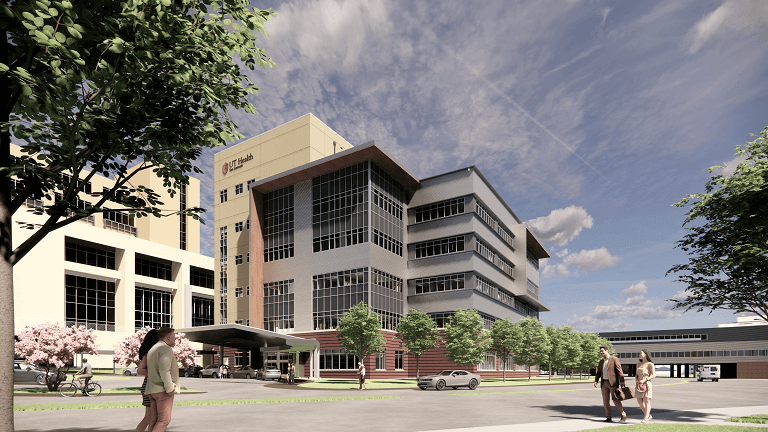$100 million comprehensive research and patient care center will offer the latest advancing therapies for dementia and all neurologic disorders
Amid a rising tsunami of needed care for dementia and other neurologic diseases, construction began this week on the $100 million Center for Brain Health, a new patient care and clinical trials facility of The University of Texas Health Science Center at San Antonio. The Center for Brain Health, expected to be complete in 2025, is among $1 billion in capital investments undertaken by UT Health San Antonio over the next four years including the UT Health San Antonio Multispecialty and Research Hospital.
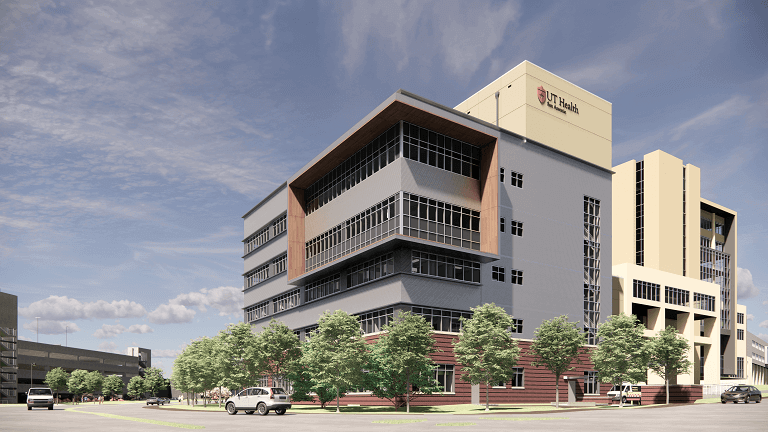 The Center for Brain Health is being built to advance research and provide innovative expert care of patients with Alzheimer’s disease, related dementias, movement disorders, amyotrophic lateral sclerosis (ALS) and other vexing health concerns. The facility also will serve as a training venue for medical residents and postgraduate trainees.
The Center for Brain Health is being built to advance research and provide innovative expert care of patients with Alzheimer’s disease, related dementias, movement disorders, amyotrophic lateral sclerosis (ALS) and other vexing health concerns. The facility also will serve as a training venue for medical residents and postgraduate trainees.
“There is an urgency to our standing up this new comprehensive center of care, the first of its kind in our region,” said William L. Henrich, MD, MACP, president of UT Health Science Center San Antonio, also called UT Health San Antonio.
The primary risk factor for developing dementia is a person’s age. According to census data, Bexar County is home to 250,000 senior adults 65 and older, and the number is projected to grow as San Antonio is an attractive retirement destination. The city’s population is more than 60 percent Hispanic. Data show Hispanics are 1.5 times more likely than Caucasians to develop dementia.
One of every six Americans suffers from brain disease including dementia, headache, epilepsy, Parkinson’s disease, ALS, neuropathy and multiple sclerosis.
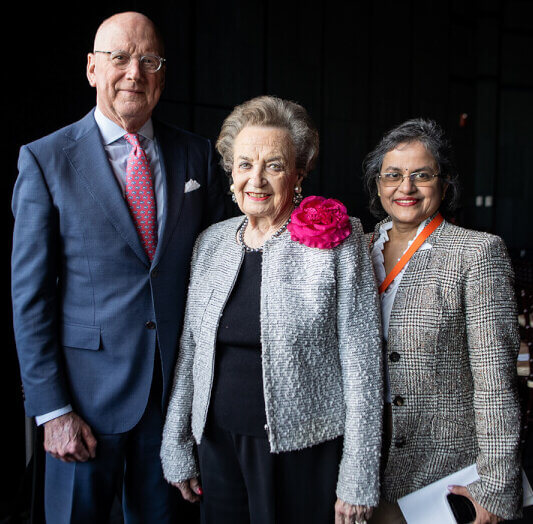
“The Center for Brain Health will be a critically important site of clinical research, offering the latest advancing therapies for dementia, neurodegenerative diseases and all neurologic disorders,” Sudha Seshadri, MD, said. “It will also be a major U.S. center in the recruitment of Hispanics into clinical trials, expanding our nation’s understanding of how these diseases specifically affect them.”
Seshadri is professor of neurology and founding director of the Glenn Biggs Institute for Alzheimer’s and Neurodegenerative Diseases at UT Health San Antonio. The Biggs Institute will share space in the Center for Brain Health with the Department of Neurology of UT Health’s Joe R. and Teresa Lozano Long School of Medicine.
Designed by Alamo Architects Inc. and TreanorHL, the Center for Brain Health will contain 75 exam rooms, 50 faculty offices, a 12-chair non-oncology infusion center and an outpatient pharmacy. The five-level building, 103,500 gross square feet in size, will provide ease of access for families and patients and meet their many needs under one roof. The builder is Joeris General Contractors, Ltd.
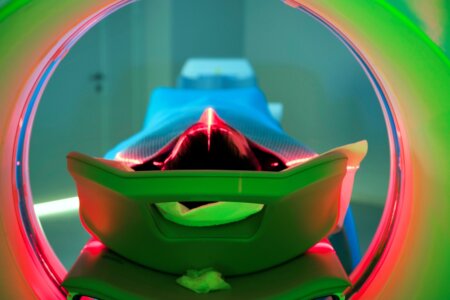 Designed services include advanced clinical and research imaging by the region’s most powerful 7-Tesla magnetic resonance imaging (MRI) system and a positron emission tomography/computed tomography (PET-CT) system. The 7-Tesla MRI system will provide high-resolution images to inform diagnoses, treatment and research. Other clinical services will include phlebotomy, radiology, electrodiagnostic studies for the evaluation of neuromuscular disorders, and electroencephalography (EEG) to assist with the diagnosis and treatment of epilepsy.
Designed services include advanced clinical and research imaging by the region’s most powerful 7-Tesla magnetic resonance imaging (MRI) system and a positron emission tomography/computed tomography (PET-CT) system. The 7-Tesla MRI system will provide high-resolution images to inform diagnoses, treatment and research. Other clinical services will include phlebotomy, radiology, electrodiagnostic studies for the evaluation of neuromuscular disorders, and electroencephalography (EEG) to assist with the diagnosis and treatment of epilepsy.
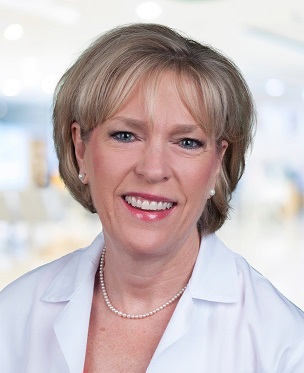
“Neurology patient care services, including those for dementia and disorders such as ALS, require comprehensive assessments accompanied by imaging studies, neuropsychology testing, family services and other facets,” said Carlayne Jackson, MD, professor and chairman of the Department of Neurology. She directs UT Health San Antonio’s Neuromuscular Disorders Program, which offers a Muscular Dystrophy Association (MDA) Clinic that is one of only 38 MDA/ALS Research Centers in the country. The program also is an ALS Association-Certified Treatment Center of Excellence.
A team of psychologists, radiologists and other professionals in the Center for Brain Health will align closely with the neighboring large outpatient practice at UT Health San Antonio’s Medical Arts and Research Center (MARC). This connectivity and integration will allow patients and families to see a neurologist in the Center for Brain Health, then pass through an enclosed walkway to the MARC for appointments with a cardiologist, nephrologist or other specialist as needed. The MARC is located at 8300 Floyd Curl Drive.
In September 2021, the Biggs Institute, in collaboration with The University of Texas Rio Grande Valley, attained premier designation by the National Institute on Aging as an Alzheimer’s Disease Research Center (ADRC). The South Texas ADRC is one of 33 funded by NIA at major medical centers across the United States.
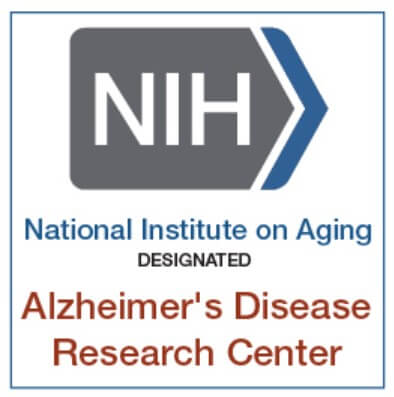 “This is the state’s only ADRC,” Henrich said. “The advanced patient care and cutting-edge clinical trials offered in the Center for Brain Health to address dementia and many other diseases will be unique and not duplicated for hundreds of miles in any direction.”
“This is the state’s only ADRC,” Henrich said. “The advanced patient care and cutting-edge clinical trials offered in the Center for Brain Health to address dementia and many other diseases will be unique and not duplicated for hundreds of miles in any direction.”
The public need not wait until the building opens to inquire about clinical trials in dementia and other neurologic disorders. Pertaining to dementia, for example, current trials are enrolling eligible participants who are healthy volunteers, have mild cognitive impairment, or have a diagnosis of early Alzheimer’s disease or advanced Alzheimer’s. Please call (210) 567-8229 or visit https://biggsinstitute.org/clinical-trials/.
Members of the 87th Texas Legislature, including the entire Bexar County delegation, approved capital construction assistance project funds to help finance the Center for Brain Health. Henrich thanked them for their foresight. “Our goal is to raise $10 million or more in community philanthropy to support this center, as well,” he said.
The University of Texas System Board of Regents approved Permanent University Fund bond proceeds to be used for infrastructure, including a central energy plant, that will benefit the Center for Brain Health and the surrounding campus. Henrich thanked the Regents for their authorization and “their belief in our drive and commitment to the people of the state of Texas.”
See more exciting UT Health San Antonio brain health initiatives at AdvancingBrainHealth.org.
UT Health Physicians, the multispecialty clinical practice of the Long School of Medicine, is reaching more patients than ever before. From 17 clinical sites in 2017, the practice’s 1,000 providers will see patients in 30 clinical sites by 2024. Another part of the $1 billion in new capital investments is UT Health San Antonio at Kyle Seale Parkway, a five-story, 108,000-square-foot medical facility expected to open in 2024.
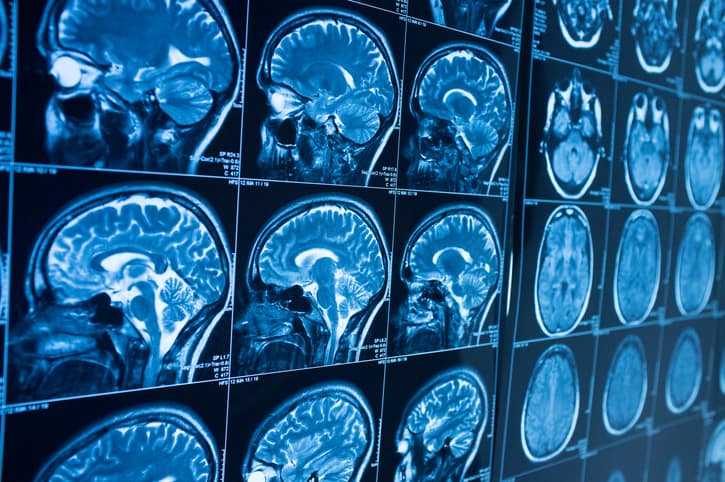 The epicenter of care for those with neurologic disorders will be the Center for Brain Health, although pearls of information are being discovered in many UT Health San Antonio laboratories and clinics across numerous facilities.
The epicenter of care for those with neurologic disorders will be the Center for Brain Health, although pearls of information are being discovered in many UT Health San Antonio laboratories and clinics across numerous facilities.
“UT Health San Antonio initiatives to understand and advance brain health extend far beyond one building,” Henrich said. “Faculty are gleaning knowledge about post-traumatic stress disorder, stroke, pain control, substance use disorders, mental illness and more. The Center for Brain Health building is a tangible symbol of our overall commitment to caring for people and fathoming this most extraordinary central processing unit — the brain — that enables us to live out our dreams.”


